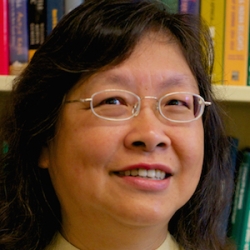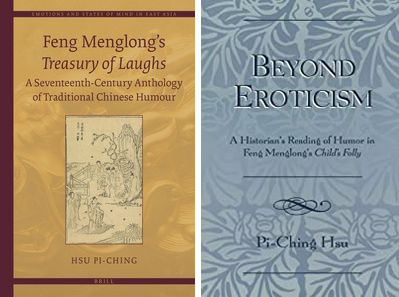
Pi-ching Hsu
In both teaching and research, I love to explore the juncture of history and literature. As art imitates life and life also imitates art, I believe history and literature can inform each other in numerous ways. This is particularly true with regard to China, where an amazingly exuberant literary tradition has for millennia molded the collective mentality and behavior of not only the intellectuals but also the semi-literate and even the illiterate populace. Furthermore, many Chinese historians double as essayists and storytellers. In addition to producing official historical records, they examine historical controversies, suggest alternative interpretations and investigate historical probabilities in their literary works. Therefore, to get a fuller picture of historical truth in both the spiritual and the materialistic aspects, I take an interdisciplinary approach to history, looking at both non-fictional and fictional source materials.
Sima Qian, the greatest historian of ancient China, assigned historians a special mission: to unearth the stories of unsung heroes. My biggest unsung hero so far, research-wise, is Feng Menglong, a marginalized humorist, storyteller, historian and political activist, who spent the last years of his life trying to restore Ming China, whose government had failed to recognize his talent and patriotism. To Feng Menglong, only those who are children at heart can do truly heroic deeds, because they are driven by spontaneous emotions, without calculating what it is going to cost them. Isn’t this romantic?
EDUCATION
- B.A. Foreign Languages and Literature, National Taiwan University, June 1982
- M.A. East Asian Studies, University of Minnesota, July 1990
- Ph.D. History, University of Minnesota, July 1994
COURSES RECENTLY TAUGHT
Undergraduate:
- HIST 300, Seminar on Historical Analysis
- HIST 569, Ancient Chinese Civilization
- HIST 570, Imperial China
- HIST 571, History of Modern China
- HIST 572, Taiwan: History, Memory, and Imagination
- HIST/WGS 575, History of Women in China and Japan
- HIST 590, Topics in Asian History: Civilizing Demons: Religious, Cultural, and Political Assimilations in Journey to the West
- HIST 644, Proseminar in World History: Confucius Says—Or Not?
- HIST 644, Proseminar in World History: Travelers to the Dragon Kingdom
- HIST 578, History of Japan (last offered: Spring 2011; the torch has been passed on)
Graduate:
- HIST 805, Seminar in Women’s History: The History of Gender in East Asian Societies
- HIST 840, Seminar on Asian History: Gender, Religion, and the Fantastic in Early Modern China
RESEARCH INTERESTS
- Pre-modern Chinese social, cultural, and intellectual history
- History of women and gender
- History of Taiwan
- History of humor and emotions
SELECTED PUBLICATIONS

Books:
Articles:
- “Koxinga’s Controversial Father and Mysterious Mother: A Tragic Love Story,” Ming Studies 87 (2023): 5-28
- “Feng Menglong’s Treasury of Laughs: A Humourous Reflection on Self and Society in Ming China, ” in Paolo Santangelo, ed., Laughing in Chinese (Rome: Aracne Editrice, 2012): 253-289.
- “Jokes on the Human Body from Feng Menglong’s Treasury of Laughs,” Ming Studies 64 (September 2011): 46-62.
- “Tang Saier and Yongle: Contested Images of a Rebel Woman and a Monarch in Ming-Qing Narratives,” Ming Studies 56 (Fall 2007): 6-36.
- “Emotions and Dreams in Feng Menglong’s Three Words: An Intellectual Historical Inquiry,” Ming Qing Yanjiu (2006): 67-95.
- “A Reconsideration of Some Mysteries Concerning Feng Menglong’s Authorship,” Chinese Literature: Essays, Articles, Reviews 28 (2006): 159-183.
- “Courtesans and Scholars in the Writings of Feng Menglong: Transcending Gender and Status,” Nan Nü: Men, Women and Gender in Early and Imperial China 2, No. 1 (March 2000): 40-77.
- "Feng Meng-lung's Treasury of Laughs: Humorous Satire on Seventeenth-Century Chinese Culture and Society," The Journal of Asian Studies 57, No. 4 (November 1998): 1042-1067.
- "Lingering Fragrance: The Poetry of Tu Yaose and Shen Tiansun" (co-authored with Ann Waltner), The Journal of Women's History No. 4 (Winter 1997): 28-53.
Book Reviews:
- Review of Ōki Yasushi and Paolo Santangelo, Shan’ge, the ‘Mountain Songs’: Love Songs in Ming China. Emotions and States of Mind in East Asia, vol. 2 (Leiden and Boston: Brill, 2011), China Review International 17, No. 4 (2010, published 2012): 469-473.
- Review of Judith Farquhar, Appetites: Food and Sex in Post-Socialist China (Durham: Duke University Press, 2002), Journal of the History of Sexuality 12, No. 3 (July 2003): 489-493.
- Review of Shih-shan Henry Tsai, Perpetual Happiness: The Ming Emperor Yongle (Seattle: University of Washington Press, 2001), Journal of the American Oriental Society 122, No. 4 (2002): 849-850.
- Review of Angela Zito, Of Body & Brush:Grand Sacrifice as Text/Performance in Eighteenth-Century China (Chicago: University of Chicago Press, 1997),Journal of Asian and African Studies15, No. 3 (2000): 362-363.
- Review of Charlotte Furth, A Flourishing Yin: Gender in China’s Medical History, 960-1665 (Berkeley: University of California Press, 1999), Journal of the History of Sexuality 9, No. 3 (July 2000): 362-365.
- Review of Tu Wei-ming, ed., Confucian Traditions in East Asian Modernity: Moral Education and Economic Culture in Japan and the Four Mini-Dragons (Cambridge: Harvard Univ. Press, 1996), The Historian 61, No. 2 (Winter 1999): 448-49.
- Review of Jacques Gernet, Buddhism in Chinese Society: An Economic History (New York: Columbia Univ. Press, 1995), The Historian 59, No. 2 (Winter 1997): 449-50.